Expressing breastmilk for your neonatal baby
Even if your newborn baby is too small or too sick to breastfeed, they can still be fed using your expressed breastmilk (EBM) through other feeding techniques.
All Neonatal Unit (3B) nursing staff attend general education about breastfeeding and lactation and are available to support you and answer any questions. Lactation consultants within the hospital 7 days a week that can provide more specialised support.
- Wash your hands with soap and water and dry on a clean paper towel before expressing.
- Use a clean container, medicine cup or syringe, these can be collected from beside the fridge.
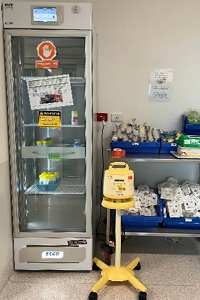
- Ensure you are sitting comfortably.
- Gently stroke the breast towards the nipple. This stimulates the reflex.
- Place the fingers underneath the breast, so the first finger is just below and the thumb is just above the areola, about 3 to 4cm back from the nipple.
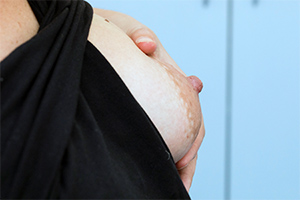
- Gently press the fingers and thumb pads (not fingertips) back towards the chest, then compress the breast tissue and hold briefly.
- Release the breast tissue.
- Do not squeeze or pinch your nipple.
- Repeat the action in a rhythm similar to baby’s sucking.
- Rotate the position of the fingers and thumb around the breast to express all of the breast.
- When colostrum is pearling or dripping easily, it is time to collect the colostrum using the clean container, medicine cup or syringe.
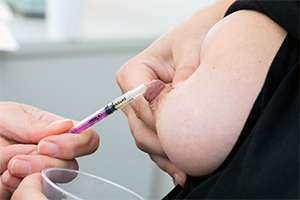
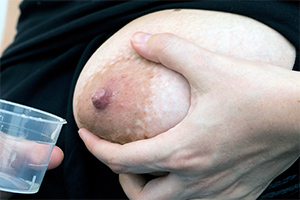
- Label the syringes or medicine cup with a red EBM sticker and your baby’s white sticker and fill in the date and time of the expression. Read more about labelling and storing expressed breast milk.
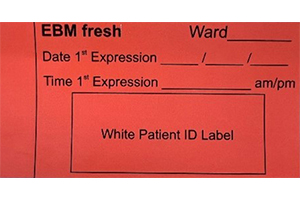
(Above information courtesy Women and Newborn Health Service)
If your baby is in the Fiona Stanley Hospital Neonatal Unit (Ward 3B), you can borrow a breast pump until your baby is discharged. If you wish to borrow a breast pump, ask your nurse who will:
- ensure you sign a consent form before taking the breast pump home with you
- give you a page of your baby’s white sticker labels so you can label your expressed breastmilk
- show you where to collect sterile expressing kits, sterile bottles and red EBM labels (all located beside the fridges on the neonatal unit).
- ensure you are using the correct sized kit by measuring your nipples with the sizing guides provided.
Before using the electric breast pump
Wash your hands thoroughly with soap and water before expressing and ensure you use clean bottles each time.
Label the bottles with a red EBM sticker and your baby’s white sticker and fill in the date and time of the expression. Read more about labelling and storing expressed breast milk.
How to use the breast pump
Using the electric breast pump at your baby’s bedside helps increase your milk supply and allows you to stay close to your baby for longer.
See how to use a:
To prevent infection, collect a new expressing kit after every 8 expressions (one set every 24 hours) and ensure you clean your equipment after each expression.
Cleaning breast pump equipment
- Please clean your breast pump equipment in the designated sink in the parent’s lounge.
- Do not wash the tubing – if necessary, wipe it down with a paper towel.
- Separate the pieces, including the valve and membrane.
- Immediately rinse with cold water all pieces touched by breastmilk.
- Using the white buckets and soap provided, wash the equipment in hot, soapy water with the bottle brush.
- Rinse all equipment thoroughly with clean hot water. Shake off excess water.
- Airdry all equipment on a clean paper towel at your baby’s bedside. You can then store the equipment in the clean, dry white container provided.
- Wipe down the electric pump with the hospital’s surface wipes.
For further information, see the cleaning instructions for the:
Procedures for labelling, storing and transporting expressed breastmilk are much stricter for sick and babies in hospital than for healthy babies at home.
To help prevent contamination and infection, it is vital you wash your hands before and after:
- handling and feeding your baby
- using expressing equipment.
Wherever possible, we encourage you to use expressing equipment provided by the hospital. You will also be supplied with an electric expressing pump, expressing kits and sterile disposable bottles and labels
Find out more
Learn about:
- establishing your expressed breastmilk supply
- labelling, storing and transporting expressed breastmilk
- you and your baby's neonatal journey
Contact us
Fiona Stanley Hospital Neonatal Unit (3B) patients can phone the:
- Neonatal Unit on 6152 0215, 24 hours a day, 7 days a week
- Fiona Stanley Hospital Lactation Consultant on 0403 137 964 between:
- 8:00am to 4:00pm, Monday to Friday
- 8:00am to 2:00pm, Saturday and Sunday.
Other breastfeeding support
- Find your closest private lactation consultant
- Find your local child health centre (external site)
- Australian Breastfeeding Association (external site)
Available 24 hours a day, 7 days a week
Phone the Helpline on 1800 686 268 - Ngala (external site)
Phone the Ngala Parenting Line on 9368 9368
Outside the metropolitan area, free call 1800 111 546 (free from land line only), 8.00am to 8.00pm, 7 days a week

